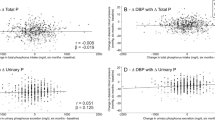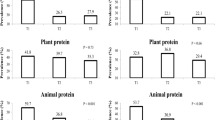Abstract
There is growing evidence from epidemiological studies that dietary protein may beneficially influence blood pressure (BP), but findings are inconclusive. We performed a meta-analysis of 29 observational studies and randomized controlled trials (RCTs) of dietary protein and types of protein in relation to BP or incident hypertension, published until January 2012. The analysis included eight cross-sectional studies (n=48 985), four prospective studies (n=11 761) and 17 RCTs (n=1449). A modest inverse association between total protein intake and BP (−0.20 mm Hg systolic (95% CI: −0.39, −0.01) per 25 g (∼1 s.d.)) was found in cross-sectional studies, but not in prospective studies (relative risk of 0.99 (95% CI: 0.96, 1.02)). For RCTs that used carbohydrate as a control treatment, the pooled BP effect was −2.11 mm Hg systolic (95% CI: −2.86, −1.37) for a weighed mean contrast in protein intake of 41 g per day. A non-significant inverse association of −0.52 mm Hg systolic (95% CI: −1.10, +0.05) per 11 g (∼1 s.d.) was found for plant protein in cross-sectional studies, whereas animal protein was not associated with BP. In prospective studies and RCTs, however, the associations of plant protein and animal protein with BP were broadly similar. These findings suggest that increasing the intake of protein at the expense of carbohydrates may have a beneficial effect on BP. The BP effect of specific types of protein remains to be established.
This is a preview of subscription content, access via your institution
Access options
Subscribe to this journal
Receive 12 digital issues and online access to articles
$119.00 per year
only $9.92 per issue
Buy this article
- Purchase on Springer Link
- Instant access to full article PDF
Prices may be subject to local taxes which are calculated during checkout



Similar content being viewed by others
References
Chobanian AV, Bakris GL, Black HR, Cushman WC, Green LA, Izzo JL et al. Seventh report of the Joint National Committee on Prevention, Detection, Evaluation, and Treatment of High Blood Pressure. Hypertension 2003; 42 (6): 1206–1252.
Reducing Risks, Promoting Healthy Life. World Health Report 2002 2002.
Whelton PK, He J, Appel LJ, Cutler JA, Havas S, Kotchen TA et al. Primary prevention of hypertension: clinical and public health advisory from the National High Blood Pressure Education Program. JAMA 2002; 288 (15): 1882–1888.
Appel LJ, Brands MW, Daniels SR, Karanja N, Elmer PJ, Sacks FM . Dietary approaches to prevent and treat hypertension: a scientific statement from the American Heart Association. Hypertension 2006; 47 (2): 296–308.
Appel LJ, Moore TJ, Obarzanek E, Vollmer WM, Svetkey LP, Sacks FM et al. A clinical trial of the effects of dietary patterns on blood pressure. N Engl J Med 1997; 336 (16): 1117–1124.
Altorf-van der Kuil W, Engberink MF, Brink EJ, van Baak MA, Bakker SJL, Navis G et al. Dietary protein and blood pressure: a systematic review. PLoS ONE 2010; 5 (8): e12102.
Altorf-van der Kuil W, Engberink MF, Geleijnse JM, Boer JMA, Verschuren WMM . Sources of dietary protein and risk of hypertension in a general Dutch population. Br J Nutr 2012; 108 (10): 1897–1903.
Altorf-van der Kuil W, Engberink MF, van Rooij FJ, Hofman A, Van’t Veer P, Witteman JC et al. Dietary protein and risk of hypertension in a Dutch older population: the Rotterdam study. J Hypertens 2010; 28 (12): 2394–2400.
Altorf-van der Kuil W, Engberink MF, Vedder MM, Boer JMA, Verschuren WMM, Geleijnse JM . Sources of dietary protein in relation to blood pressure in a general Dutch population. PLoS ONE 2012; 7 (2): e30582.
He J, Wofford MR, Reynolds K, Chen J, Chen C, Myers L et al. Effect of dietary protein supplementation on blood pressure: a randomized, controlled trial. Circulation 2011; 124: 589–595.
Larsen RN, Mann NJ, Maclean E, Shaw JE . The effect of high-protein, low-carbohydrate diets in the treatment of type 2 diabetes: a 12 month randomised controlled trial. Diabetologia 2011; 54 (4): 731–740.
Pal S, Ellis V . The chronic effects of whey proteins on blood pressure, vascular function, and inflammatory markers in overweight individuals. Obesity 2010; 18 (7): 1354–1359.
Teunissen-Beekman KFM, Dopheide J, Geleijnse JM, Bakker SJL, Brink EJ, De Leeuw PW et al. Protein supplementation lowers blood pressure in overweight adults: effect of dietary proteins on blood pressure (PROPRES), a randomized trial. Am J Clin Nutr 2012; 95 (4): 966–971.
Voedingscentrum. Zo eet Nederland, Resultaten van de voedselconsumptiepeiling 1997–1998 (Dutch food consumption survey of 1997–1998). Netherlands Nutrition Centre: The Hague, 1998.
Higgins JP, Thompson SG . Quantifying heterogeneity in a meta-analysis. Stat Med 2002; 21 (11): 1539–1558.
Greenland S, Longnecker MP . Methods for trend estimation from summarized dose-response data, with applications to meta-analysis. Am J Epidemiol 1992; 135 (11): 1301–1309.
He J, Klag MJ, Whelton PK, Chen JY, Qian MC, He GQ . Dietary macronutrients and blood pressure in southwestern China. J Hypertens 1995; 13 (11): 1267–1274.
Stamler J, Caggiula A, Grandits GA, Kjelsberg M, Cutler JA . Relationship to blood pressure of combinations of dietary macronutrients. Findings of the Multiple Risk Factor Intervention Trial (MRFIT). Circulation 1996; 94 (10): 2417–2423.
Masala G, Bendinelli B, Versari D, Saieva C, Ceroti M, Santagiuliana F et al. Anthropometric and dietary determinants of blood pressure in over 7000 Mediterranean women: the European Prospective Investigation into Cancer and Nutrition-Florence cohort. J Hypertens 2008; 26 (11): 2112–2120.
Wang YF, Yancy WY, Yu D, Champagne C, Appel LJ, Lin PH . The relationship between dietary protein intake and blood pressure: results from the PREMIER study. J Hum Hypertens 2008; 22 (11): 745–754.
Umesawa M, Sato S, Imano H, Kitamura A, Shimamoto T, Yamagishi K et al. Relations between protein intake and blood pressure in Japanese men and women: the Circulatory Risk in Communities Study (CIRCS). Am J Clin Nutr 2009; 90 (2): 377–384.
Joffres MR, Reed DM, Yano K . Relationship of magnesium intake and other dietary factors to blood pressure: the Honolulu heart study. Am J Clin Nutr 1987; 45 (2): 469–475.
Elliott P, Stamler J, Dyer AR, Appel L, Dennis B, Kesteloot H et al. Association between protein intake and blood pressure: the INTERMAP Study. Arch Intern Med 2006; 166 (1): 79–87.
Alonso A, Beunza JJ, Bes-Rastrollo M, Pajares RM, Martinez-Gonzalez MA . Vegetable protein and fiber from cereal are inversely associated with the risk of hypertension in a Spanish cohort. Arch Med Res 2006; 37 (6): 778–786.
Sacks FM, Wood PG, Kass EH . Stability of blood pressure in vegetarians receiving dietary protein supplements. Hypertension 1984; 6 (2 Part 1): 199–201.
Appel LJ, Sacks FM, Carey VJ, Obarzanek E, Swain JF, Miller ER et al. Effects of protein, monounsaturated fat, and carbohydrate intake on blood pressure and serum lipids: results of the OmniHeart randomized trial. JAMA 2005; 294 (19): 2455–2464.
Hodgson JM, Burke V, Beilin LJ, Puddey IB . Partial substitution of carbohydrate intake with protein intake from lean red meat lowers blood pressure in hypertensive persons. Am J Clin Nutr 2006; 83 (4): 780–787.
Hendler R, Bonde AA . Very-low-calorie diets with high and low protein content: impact on triiodothyronine, energy expenditure, and nitrogen balance. Am J Clin Nutr 1988; 48 (5): 1239–1247.
Meckling KA, Sherfey R . A randomized trial of a hypocaloric high-protein diet, with and without exercise, on weight loss, fitness, and markers of the Metabolic Syndrome in overweight and obese women. Appl Physiol Nutr Metab 2007; 32 (4): 743–752.
Burke V, Hodgson JM, Beilin LJ, Giangiulioi N, Rogers P, Puddey IB . Dietary protein and soluble fiber reduce ambulatory blood pressure in treated hypertensives. Hypertension 2001; 38 (4): 821–826.
Leidy HJ, Carnell NS, Mattes RD, Campbell WW . Higher protein intake preserves lean mass and satiety with weight loss in pre-obese and obese women. Obesity (Silver Spring) 2007; 15 (2): 421–429.
Brinkworth GD, Noakes M, Parker B, Foster P, Clifton PM . Long-term effects of advice to consume a high-protein, low-fat diet, rather than a conventional weight-loss diet, in obese adults with type 2 diabetes: one-year follow-up of a randomised trial. Diabetologia 2004; 47 (10): 1677–1686.
Delbridge EA, Prendergast LA, Pritchard JE, Proietto J . One-year weight maintenance after significant weight loss in healthy overweight and obese subjects: does diet composition matter? Am J Clin Nutr 2009; 90 (5): 1203–1214.
Hodgson JM, Zhu K, Lewis JR, Kerr D, Meng X, Solah V et al. Long-term effects of a protein-enriched diet on blood pressure in older women. Br J Nutr 2011; 13: 1–9.
Papakonstantinou E, Triantafillidou D, Panagiotakos DB, Koutsovasilis A, Saliaris M, Manolis A et al. A high-protein low-fat diet is more effective in improving blood pressure and triglycerides in calorie-restricted obese individuals with newly diagnosed type 2 diabetes. Eur J Clin Nutr 2010; 64 (6): 595–602.
Hochstenbach-Waelen A, Westerterp KR, Soenen S, Westerterp-Plantenga MS . No long-term weight maintenance effects of gelatin in a supra-sustained protein diet. Physiol Behav 2010; 101 (2): 237–244.
Tiwari S, Riazi S, Ecelbarger CA . Insulin’s impact on renal sodium transport and blood pressure in health, obesity, and diabetes. Am J Physiol Renal Physiol 2007; 293 (4): F974–F984.
Stamler J, Liu K, Ruth KJ, Pryer J, Greenland P . Eight-year blood pressure change in middle-aged men: relationship to multiple nutrients. Hypertension 2002; 39 (5): 1000–1006.
FAO Statistics Division. Available from http://faostat.fao.org/.
Panagiotakos DB, Zeimbekis A, Boutziouka V, Economou M, Kourlaba G, Toutouzas P et al. Long-term fish intake is associated with better lipid profile, arterial blood pressure, and blood glucose levels in elderly people from Mediterranean islands (MEDIS Epidemiological Study). Med Sci Monit 2007; 13 (7): CR307–CR312.
Acknowledgements
This study was supported by the Top Institute Food and Nutrition, Wageningen, The Netherlands, a public private partnership of science, industry and government (www.tifn.nl).
Author information
Authors and Affiliations
Corresponding author
Ethics declarations
Competing interests
The authors declare no conflict of interest.
Additional information
Supplementary Information accompanies this paper on the Journal of Human Hypertension website
Supplementary information
Rights and permissions
About this article
Cite this article
Tielemans, S., Altorf-van der Kuil, W., Engberink, M. et al. Intake of total protein, plant protein and animal protein in relation to blood pressure: a meta-analysis of observational and intervention studies. J Hum Hypertens 27, 564–571 (2013). https://doi.org/10.1038/jhh.2013.16
Received:
Revised:
Accepted:
Published:
Issue Date:
DOI: https://doi.org/10.1038/jhh.2013.16
Keywords
This article is cited by
-
Renal and dietary factors associated with hypertension in a setting of disadvantage in rural India
Journal of Human Hypertension (2021)
-
The long-term association of different dietary protein sources with metabolic syndrome
Scientific Reports (2021)
-
Impact of a high-protein diet during lactation on milk composition and offspring in a pig model
European Journal of Nutrition (2019)
-
Fruit and vegetables consumption and incident hypertension: dose–response meta-analysis of prospective cohort studies
Journal of Human Hypertension (2016)
-
Dietary Approaches to Prevent Hypertension
Current Hypertension Reports (2013)



